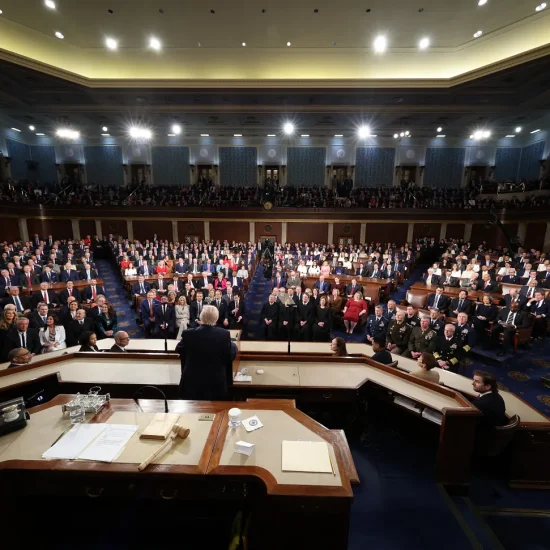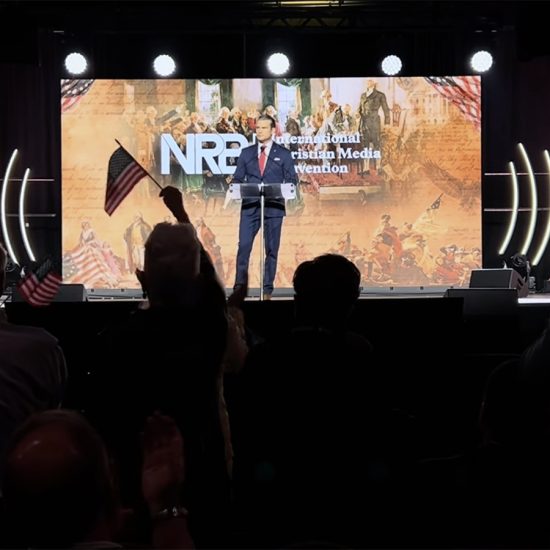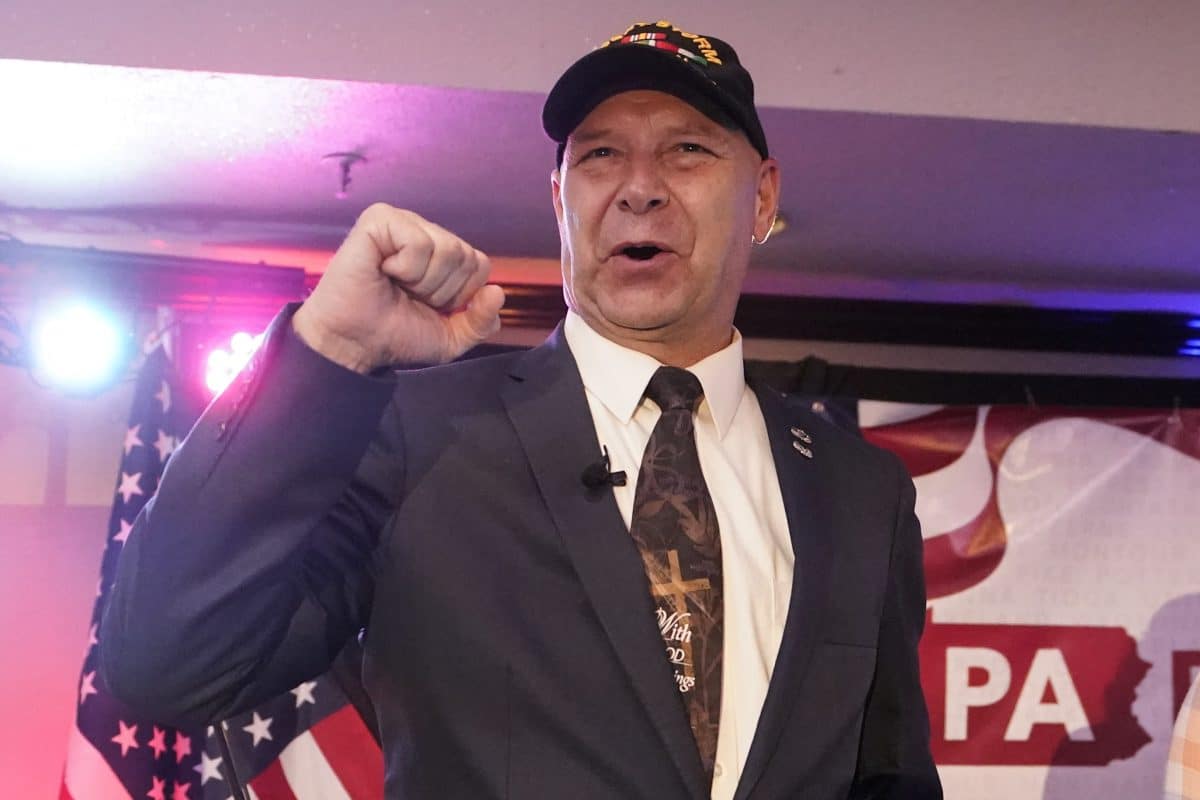
“We’re under siege now. The media doesn’t like groups of us who believe certain things, and they paint us in these awful descriptives.”
As Doug Mastriano celebrated his win Tuesday night (May 17) in the Republican primary for Pennsylvania governor, he first went on a tirade against the media for allegedly being anti-Christian as it covered his campaign. Several outlets wrote about his Christian Nationalism this month — like A Public Witness, Philadelphia Inquirer, Talking Points Memo and the Washington Post. For Mastriano, this coverage represented an attack on Christians.
“My campaign has no place for hate, bigotry, intolerance. And that’s the same for any media outlet. If I read articles where you’re attacking Christians and painting us in a particular picture that’s hateful and intolerant, well we won’t have the time of day for you,” he said as he wore a tie with the text “with God all things are possible” and a cross. “You’re not going to bully us with your hate and your rhetoric.”
As he played the role of victim during his victory rally, he compared himself to the founder of the state, William Penn.
“Our own founder came here in 1682 after being called names by the media in England because he didn’t belong to the right church. You know, he was ‘an insurrectionist!’” complained Mastriano, who was literally part of the crowd in Washington, D.C., on Jan. 6, 2021. “He suffered for his faith by a media and a political ruling class that mocked him because he didn’t have the right beliefs. Things haven’t changed. Four hundred years later, we find ourselves being mocked in the Washington Post and other outlets who will never have access because they’re full of hate.”
We would ask Mastriano if we’re one of those “other outlets,” but given the lack of comment to our previous request, we doubt he would answer. So, we’ll assume he’s lumping us in since he blocked one of us (Brian) on Twitter for sharing our report.
And we stand by our piece, especially since he doubled-down on his Christian Nationalism during his election night rally. He started his victory speech with a call-and-response from a church service.
Mastriano: “God is good.”
Crowd: “All the time.”
Mastriano: “All the time.”
Crowd: “God is good.”
At another point, he mentioned that John 8:36 is on his campaign signs before quoting the first part of the verse “If Jesus set you free”) and waiting for the audience to finish it (“you are free indeed”). Mastriano also cited 1 Corinthians 1:27 and talked about how the campaign was making history and with God making “his-story.” He even described voting for him over his Democratic opponent, Pennsylvania Attorney General Josh Shapiro, as an act of following God.
“The future for Pennsylvania under Josh Shapiro is an oppressive regime not unlike East Germany where your freedom is snatched away. So, let’s walk in freedom. Let’s choose this day, let’s choose this day to serve the Lord,” Mastriano said.
“Take a couple days off and then the great adventure continues until ultimate victory on Nov. 8,” Mastriano added before walking off the stage to Steven Curtis Chapman’s “The Great Adventure” (even though there’s more to this life than saying “I will be here” for a partisan campaign).
That speech and song wasn’t the only effort to baptize the night. Conservative Christian activist and musician Sean Feucht warmed up the crowd with praise songs like “Way Maker,” “Raise a Hallelujah,” and Hillsong’s “What a Beautiful Name.”
“If you look throughout scripture, you’ll see many times where God will call the worshipers to go ahead of the army. And I feel like even tonight what we’re doing, worship goes ahead and prepares the way,” Feucht said between songs.
“I was standing outside the Capitol in D.C. today just thinking, ‘These guys think they’re in control,’” he added before offering an almost cartoonish laugh. “The government is on his shoulders.”
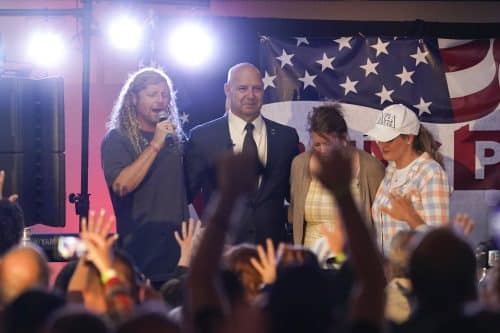
Sean Feucht (left) prays during a primary night election gathering in Chambersburg, Pennsylvania, on May 17, 2022, along with Doug Mastriano, Mastriano’s wife Rebbie, and Jenna Ellis. (Carolyn Kaster/Associated Press)
Not to be outdone, Jenna Ellis, who along with Rudy Giuliani led then-President Donald Trump’s failed efforts to overturn the 2020 election results in the courts, compared Mastriano (and Trump) to the biblical “champion” Daniel as one who “has simply stood firm on truth and has continued to lead.” Wearing a “MAGA” hat, she added, “From tonight, we’re going to celebrate a great victory in the name of Jesus and to say that we are going to start taking our country back and not shrink in cowardice.”
To be a Daniel, though, Mastriano needs some attackers trying to throw him in the lion’s den. So, he chose journalists (along with Democratic politicians) as a foil in this effort to portray himself as a righteous crusader persecuted for his faith. As John Fea, a Christian historian at Messiah University in Pennsylvania and executive editor of Current, told us on Wednesday, “Last night during his acceptance speech, Mastriano launched into a time-worn, and often successful, Christian Right strategy: play the victim.”
Fea doesn’t think such a strategy will help in the general election “with large numbers of independent voters and moderate Republicans disgusted by Mastriano’s Christian Nationalism and his willingness to build an entire campaign around Donald Trump’s “Big Lie.’” Mastriano’s Democratic opponent apparently agrees as his campaign boosted Mastriano under the belief the state senator would be the easiest Republican to defeat in the general election. But this playing-with-fire strategy that bolstered the primary chances of a candidate pushing conspiracy-laden, anti-democratic Christian Nationalism drew condemnations of its own.
While we’re not in the business of crafting campaign strategies or endorsing candidates, we do believe the Christian Nationalism of Mastriano and others poses a danger to our democracy. In saying that — and reporting on it — we aren’t attacking Christians. Quite the opposite since we also think his Christian Nationalism corrupts the witness of Christ’s global Church. So, in this issue of A Public Witness, we hop down into this lion’s den to further consider Mastriano, his attacks on the media, and the Christian Nationalism animating his campaign.
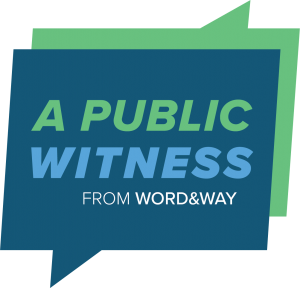 NOTE: The rest of this piece is only available to paid subscribers of the Word&Way e-newsletter A Public Witness. Subscribe today to read this essay and all previous issues, and receive future ones in your inbox.
NOTE: The rest of this piece is only available to paid subscribers of the Word&Way e-newsletter A Public Witness. Subscribe today to read this essay and all previous issues, and receive future ones in your inbox.


